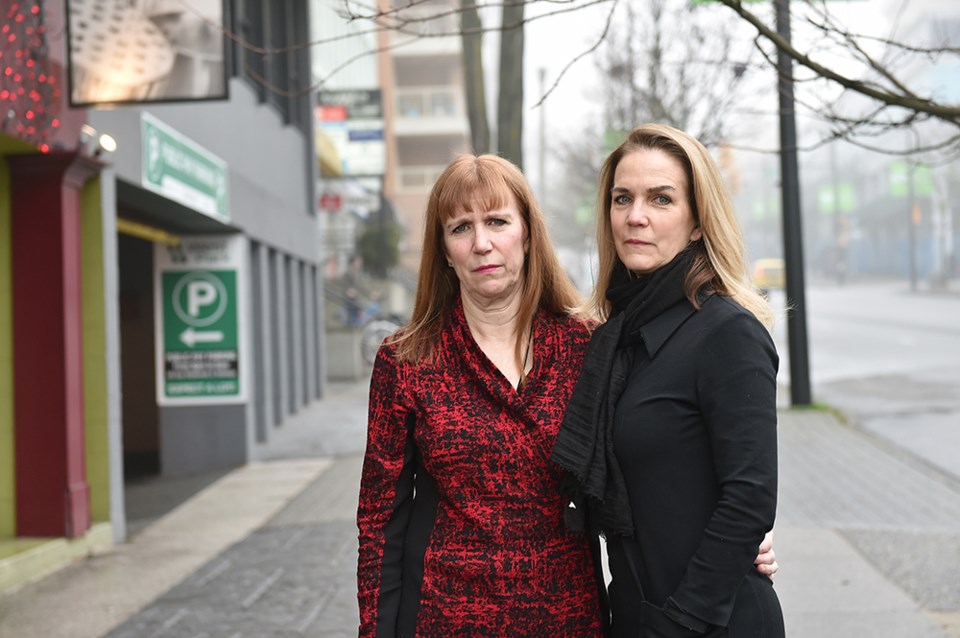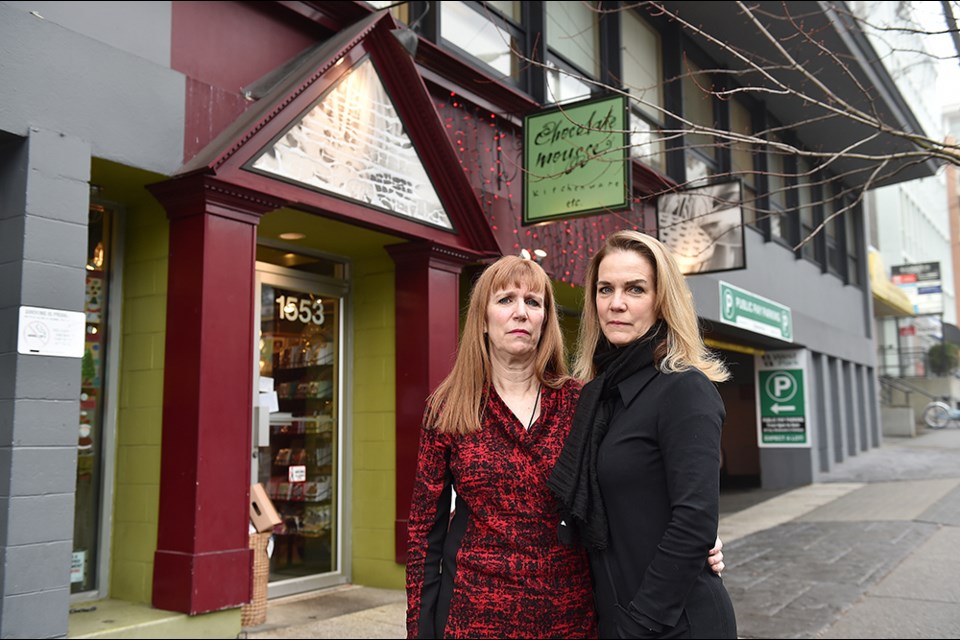After 33 years, life is no longer sweet at Chocolate Mousse Kitchenware.
The long-established, popular West End store is facing closure after its annual property tax almost doubled to around $130,000.
Owners Karen and Jane Tennant recently posted a note for customers saying it was “financially impossible for us to stay” at their Robson Street location after the City of Vancouver raised its property tax by 92.7 per cent earlier this year.
With the increase, Chocolate Mousse now pays more property tax than rent.
“That’s money right out of our pockets,” Karen Tennant tells me when I meet the sisters at the back of their store before opening hours one recent morning. The store is narrow, on two levels, and cosily filled with every type of crockery, cutlery and kitchen trinket you can think of.
“We don’t get to advertise for that, we don’t get to pay our staff more, we don’t get to take more days off … It’s just money we give them.”
Like many other retailers leasing space in Vancouver, Chocolate Mousse is on the hook for any increase in property tax due to the “triple-net” lease system, which means that, in addition to their rent, they must pay an additional charge for operating costs and taxes.
It’s a big reason many smaller, independent businesses are closing in the city, Karen says.
“It’s endemic in the city. It’s a big, big problem,” she said, describing the store she opened with her sister Jane 33 years ago as “collateral damage” in Vancouver’s ongoing affordability issues.
Development corridors
Property tax is based on the assessed value of the property in which the store is located. According to B.C. Assessment, that value more than tripled in the space of a year – from almost $17 million to $52.3 million. The latest assessment will be available Dec. 31.
In a sad irony, Chocolate Mousse looks set to be a victim of the West End Community Plan, approved by city council in December 2013 as a way to grow the neighbourhood while preserving its character.
The plan targets significant development in several “corridors” in the West End, including the Lower Robson corridor, which includes the 1500-block where the store is located.
While no plans are officially in place, the 1949 low-rise that Chocolate Mousse operates in will most likely be demolished to make way for a rental and/or social housing condo tower. Across the road at 1500 Robson, a development awaiting approval aims to build a 21-storey tower of market-rental units.
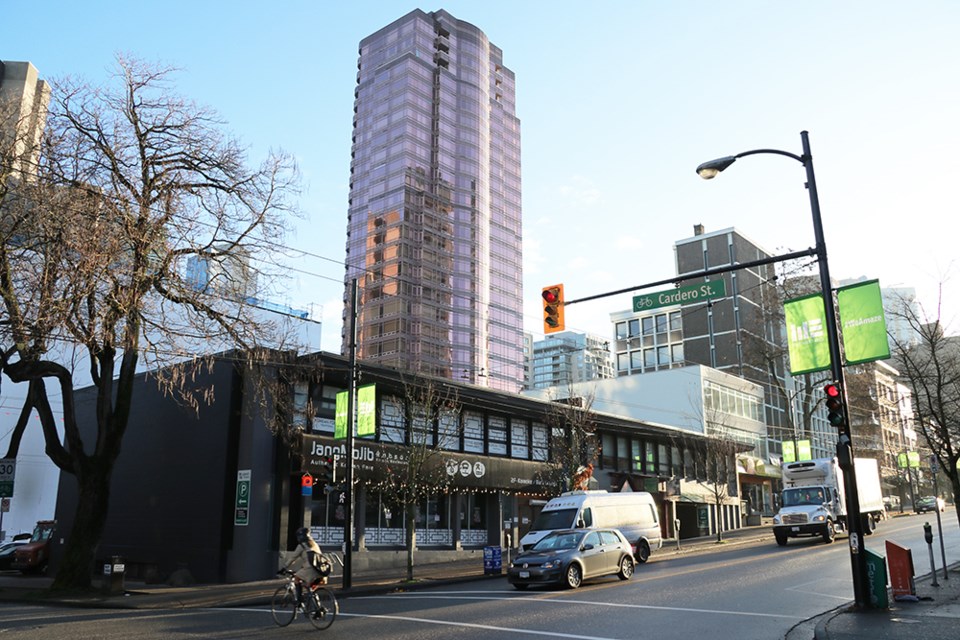
Rezoning for such future projects has had a significant impact on assessments, which are based on a property’s “highest and best use” and selling prices in the surrounding neighbourhood.
“It might be a small mom-and-pop shop, but if [the] zoning changes to much bigger use, then the change in assessment would be based on what that new zoning is,” explains Tim Morrison of B.C. Assessment.
The West End Community Plan aims to “strategically locate opportunities for new growth through increased heights and densities along the Georgia and Burrard Corridors and in Lower Robson to help deepen housing affordability and to contribute public benefits,” it says.
The Lower Robson corridor is directly west of what’s been identified as Robson Village, in which new development will be limited.
“We’re in a very bad place,” Karen admits.
“We are the pro-revitalization area of Robson. And I can see that – we don’t want to stand in the way of change. But it’s so unfair to people that have paid their dues and been here forever.
“On one hand they’re trying to house the underprivileged, and on the other hand they’re putting us out of work when we’ve worked full time since we were 17 years old,” she adds.
She says it feels like her business is being “singled out” and that she’s powerless to save it.
'Let’s show some level of reasonableness'
According to property tax agent Paul Sullivan, the root of the whole problem is the commercial tax rate, which is five times that of the residential rate.
“Right now, 46 per cent of the entire property tax burden in the City of Vancouver is being paid by seven per cent of the properties, because only seven per cent of the properties in Vancouver are commercial. … That’s fact,” says Sullivan, a partner at Burgess Cawley Sullivan & Associates.
For years, Sullivan has been advocating for a redistribution of this tax load in what he calls “thin-spreading.” As part of a joint committee with the Urban Development Institute, the province and the city, he’s also presented a number of ideas put forward by the private sector, including local Business Improvement Associations. They include taxing commercial buildings earmarked for primarily residential redevelopment at the residential rate.
“Let’s not muck with market value, let’s leave that intact. But let’s show some level of reasonableness in placing that residential tax rate on residential density that is vacant and consumes no services,” Sullivan says.
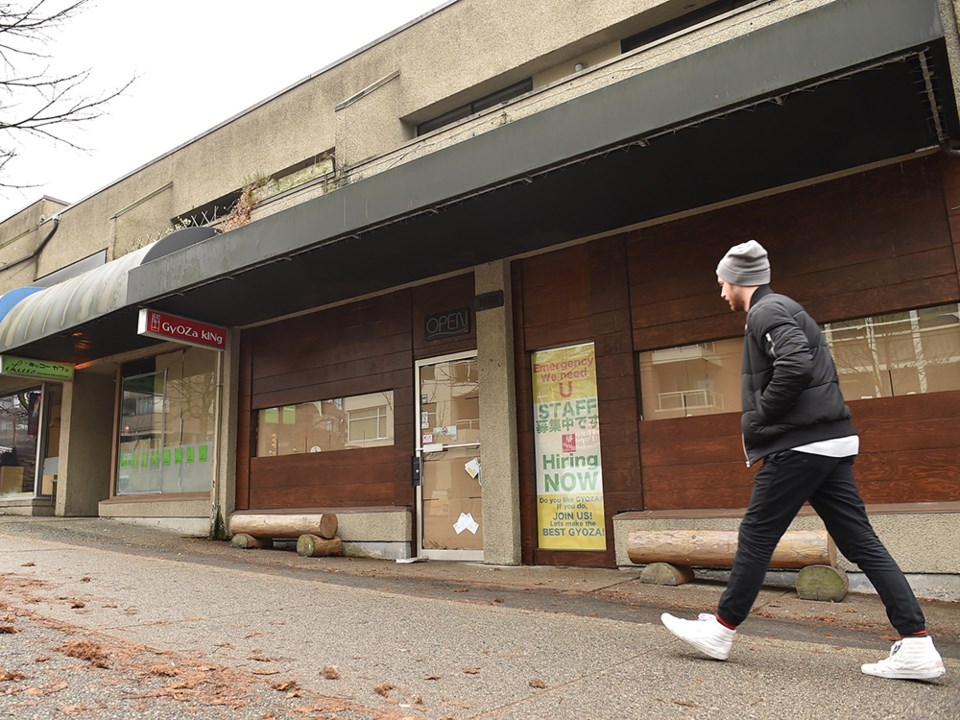
The problem is citywide, he adds.
“All of our commercial nodes – Main Street, Commercial Drive, 4th Avenue, South Granville, Broadway – 80-90 per cent of those community retailers are suffering from this issue,” Sullivan says.
It’s clear that independent businesses the length of Robson have suffered, too. The popular Gyoza King, just across the road, shuttered in October. Many other neighbouring units lie empty. The Japanese chain Muji recently opened its flagship North American store on the 1100-block, but otherwise there have been few newcomers.
“There are so many vacancies up the street because people can’t make it,” Karen says. “Because what they’re charging is not reasonable for what you’ll sell.”
Karen says that Chocolate Mousse has three options: to close; to sell; or to move, which presents many significant challenges, not least because the store still has to satisfy the conditions of its lease, which runs until January 2019.
The Tennants have looked at other locations but have yet to find anything suitable. They want to stay in the West End because of their established customer base. But even if they could move now, it wouldn’t be financially feasible.
“Even looking for a location is really futile almost because we’re not in a position to run two stores for a year-and-a-half,” Jane says.
Other tenants in the building – an extensively refurbished Korean restaurant and an internet café – have longer leases, Karen says. They very likely face bankruptcy, she believes. Neither could be contacted for comment.
$79.5-million sale
Chocolate Mousse’s customers have voiced their dismay at the store’s closure, with hundreds leaving notes of support at the front desk. Karen refers to the store as a community centre that the city doesn’t have to pay for, being popular with regulars who have shopped there for decades.
“Every day people meet people they know,” she says.
The Tennants are clear in not singling out their landlord for their financial woes, saying their rent has always been reasonable. However, the building was recently sold, adding even more uncertainty to their situation.
The B.C. Assessment website confirms the property at 1555 Robson St. is assessed at $52,357,900 as of July 1, 2016 – up from the previous year’s value of $16,830,300.
In the “Sales History” field it lists a transaction from Aug. 1, 2017 for $79.5 million – an indication of what the property’s next assessment might look like.
A title search confirmed the property’s declared value as $79.5 million, and lists the new owner as the numbered company 1135952 B.C. Ltd., Inc. The Tennants have yet to hear from their new landlord.
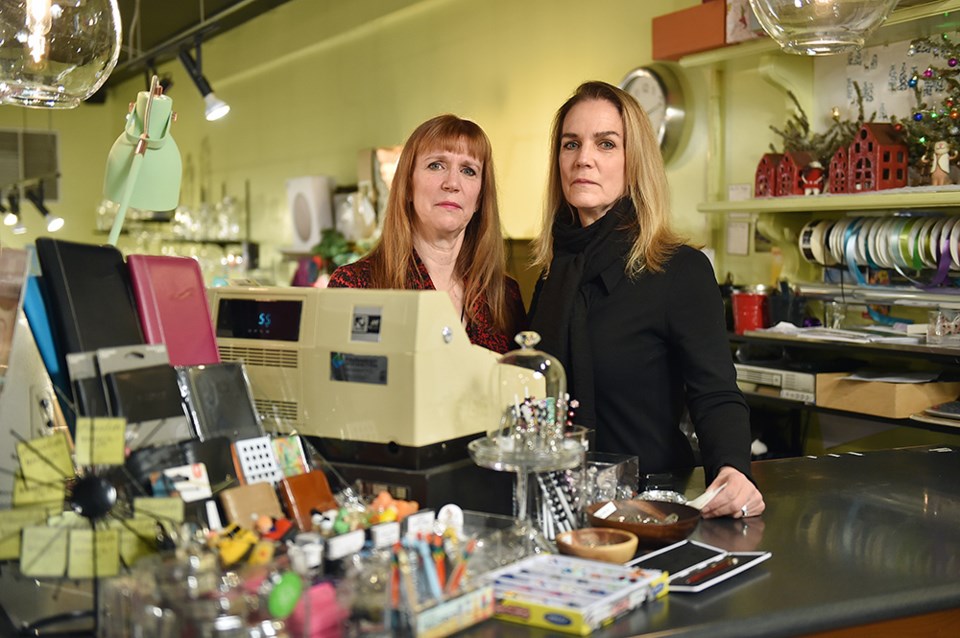
For its part, the City of Vancouver says it is aware of the financial problems affecting small, independent businesses. In an emailed response, city staff outlined several initiatives it has begun exploring to mitigate those effects.
They include exploring the idea of a “Split Tax Bill” limiting the amount of property tax a landlord passes on to his commercial tenants to the rented space only; and the Community Impact Real Estate Society, a collaboration between the city, B.C. Housing and Vancity Community Foundation that manages a portfolio of 57 commercial retail units, “to address community retail needs and maintain accessible goods and services providers in vulnerable communities.”
At the moment, CIRES is focused on the Downtown Eastside, but it could provide a model for small businesses across the city in future.
Proposals released in a report last week included transferring the property tax load for redevelopment potential from commercial tenants to the building’s owners, and to introduce commercial rent control as part of a Commercial Tenancy Act.
Sullivan says these proposals are “outrageous.”
“It’s so unworkable. It sounds good on a piece of paper: ‘We’re going to protect our merchants from paying the property tax bill associated with the redevelopment potential. We’re there for small business.’
“But they haven’t thought it through. They haven’t considered the unintended consequences of that. It’s going to force the sale of all these properties, it’s going to pit landlords against tenants in endless litigation, and it’s going to stall if not discontinue commercial development in the city or the province.”
'This is happening in major cities across the world'
The Tennants were given a glimmer of hope from a Globe and Mail story last month that reported how Vancouver was studying other cities’ approach to affordability problems, including supporting “historic” independent businesses in rapidly developing neighbourhoods.
Karen called city planner Tom Wanklin for more information, but was told the city is only halfway through its study.
Reached separately, Wanklin expressed his concerns about the plight of small businesses in Vancouver, and said he has heard from struggling businesses across the city. But he said there are many challenges in identifying a solution – even from a legal standpoint.
“There are many constraints,” he said. “The Vancouver charter is very clear about using public funds … to support privately owned businesses. That is a very, very clear legal consideration that we keep in mind. … Right now, it is not possible for the city to assist.”
Wanklin was waiting to receive a halfway report from consultants tasked with a pilot study that focuses on Chinatown and how that neighbourhood’s character has been changed.
“One of the first questions I’m going to ask the consultants is: If you favour one business because it’s been in existence for 30 years, how fair is that in terms of another business that might have been in existence for 29 years? Where do you draw the line? What is equitable here? Is this really the right way to go?”
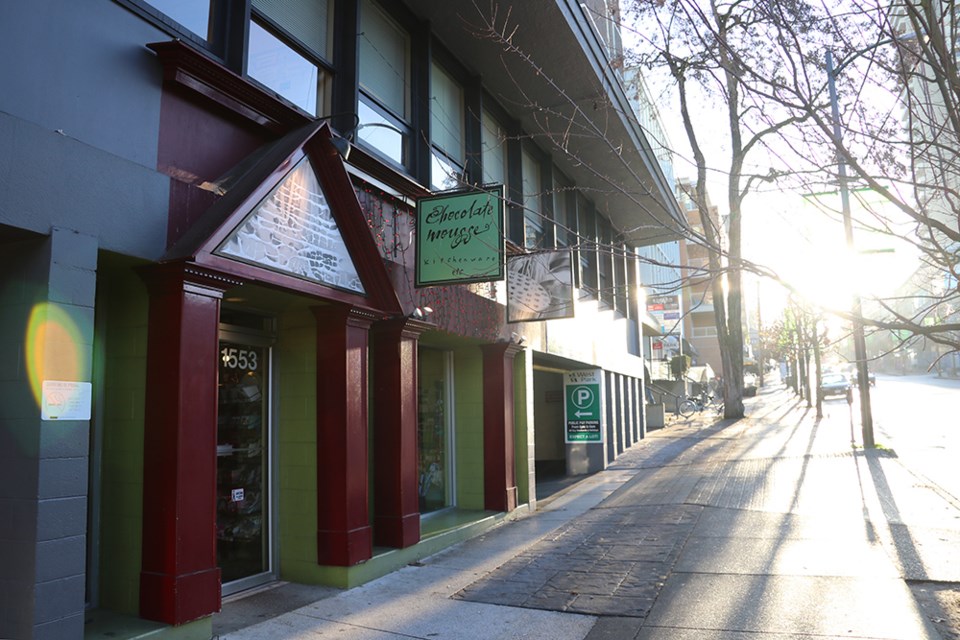
Whether the process is called “gentrification” or “commercialization of land,” it’s a problem that’s not unique to Vancouver, Wanklin adds. He recently hosted delegations from San Francisco and Manchester, England, where there are similar affordability pressures, and took them around the False Creek Flats, another area of rapid change in Vancouver.
“False Creek Flats values went up 200 per cent in one year because of speculation. … It’s just industrial land, and there’s speculation that this could change and they could sell the land for a higher price so this is tending to drive prices all the time. And this is happening in major cities across the world. It’s not unusual.
“It’s driven by change. As properties renew the old buildings are replaced, and of course the new buildings come at a higher rate. There’s the higher cost of building. The expectations of higher rentals are fuelled and driven by that process of change.
“There’s no quick solution, I’m afraid,” he says.
But it’s not what the Tennants or any other struggling businesses in Vancouver want to hear.
“It’s just not reasonable to give somebody a 92-per-cent increase in anything,” Jane says. “People couldn’t afford that in their personal bills, in their mortgage payment. It’s just unfathomable to stick somebody with that kind of expense – and what are they thinking, that we’ll survive?”
There’s a knock on Chocolate Mousse’s front door, which brings our chat to an end.
“The store is open. Better get up there and sell something,” Karen says with a wry laugh.
“We have bills to pay.”
